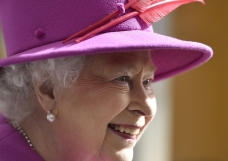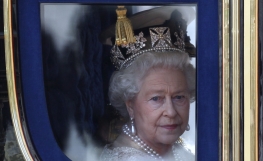It hit me about nine months ago.
The most famous woman in the world, and probably one of the most admired, is an extraordinary example of '6M' Christian discipleship in daily life. And her fruitfulness is multi-dimensional, not only clear in her character, but displayed in a range of ways.
So the Queen does model godly character – love, joy, peace. She is patient and kind to every person she meets – even if they happen to be the 230th person at the end of a long cold day in a factory in a small town in the wilds of Yorkshire.
She makes good work, not only putting in the hours but doing so in a way that she self-consciously models on Jesus and in clear dependence on him. There to serve the interests of her people whether on a state visit to India or in the thoughtful questions she poses to Prime Ministers in their weekly meetings.
She ministers grace and love beyond the call of duty in countless acts of kindness . Visiting sick people on the Windsor estate, choosing the Sunday School prizes at the church on the Sandringham estate, arranging to fly a journalist home on the royal jet so he can get home for the birth of his child.
She seeks to mould a culture of proactive, generous service to others among her staff and more broadly in the nation and the Commonwealth. Celebrating kindness in ordinary daily life even more than she affirms excellence in any field.
She has been a mouthpiece for truth and justice in the creation and nurturing of relationships within the Commonwealth that have brought greater peace, deeper reconciliation and social stability than would otherwise have been the case.
And of course, she has been an overt, clear and winsome messenger of the gospel, pretty much every Christmas since her broadcasts began. Her approach is testimonial, not argumentative, simply expressing what Jesus means to her and what she understands the heart of the Christian gospel to be.
"Although we are capable of great acts of kindness, history teaches us that we sometimes need saving from ourselves – from our recklessness or our greed. God sent into the world a unique person – neither a philosopher nor a general (important though they are) – but a Saviour, with the power to forgive." (2011)
The reality is that the Queen's faith is personal, not ceremonial. It is central to her life and work, rather than peripheral. Indeed, though we know very little about what the Queen actually thinks about most things – she has chosen to tell us a great deal about what she thinks about Jesus.
And that makes the mainstream media's relative silence on the matter not merely journalistically negligent, but curiously disrespectful. It is as if one were to say to Mother Teresa, "We love your charity work but we're not interested in why you do it or who you do it for."
It is in her Christmas broadcasts that we learn most about Her Majesty's faith. Those broadcasts make it clear that for her, Christ is not just for Christmas but for all of life. So, for example, in 2014 she said:
"For me, the life of Jesus Christ, the Prince of Peace, whose birth we celebrate today, is an inspiration and an anchor in my life."
It's a wonderful summary. He is both an inspiration – showing her the way and empowering her to walk it – and an anchor – offering her a secure haven.
And then in that same speech, she went on to describe him as: "A role-model of reconciliation and forgiveness, he stretched out his hands in love, acceptance and healing."
Elsewhere she is very clear what aspects of Christ's life particularly inspire her. And the key theme seems to be service.
"This is the time of year when we remember that God sent his only son 'to serve, not to be served'. He restored love and service to the centre of our lives in the person of Jesus Christ." (2011)
Indeed, for the Queen, service is both the keynote of her own life and the attitude she calls her people to. Yes, she often comes back to the Parable of the Good Samaritan but for her loving your neighbour is more than occasional acts of kindness, it is the ready giving of one's very best gifts and talents for the sake of others.
Hearteningly, the Queen is open, if not detailed, about the challenges she has faced. In 1992, towards the end of her Annus Horribilis, she famously expressed thanks for the prayers of others in helping to sustain her. But you can see this vulnerability and humility in many other places. In 2002, she said this:
"I know just how much I rely on my faith to guide me through the good times and the bad. Each day is a new beginning. I know that the only way to live my life is to try to do what is right, to take the long view, to give of my best in all that the day brings, and to put my trust in God."
I imagine this will resonate with most of us.
In recent weeks, lots of people have asked me why the Queen wrote a foreword for our little book about her faith – The Servant Queen and the King she serves. None of us really know, but people who know her better than I think it is for two reasons. Faith is important to her, and the book points – as she does – to the King she serves.
Mark Greene is Executive Director of LICC, and co-author of The Servant Queen and the King she serves, produced by HOPE, Bible Society and LICC. An ideal gift to develop a conversation about faith it is available from www.cpo.org.uk for £1 per copy plus P&P when bought in packs of 10.















